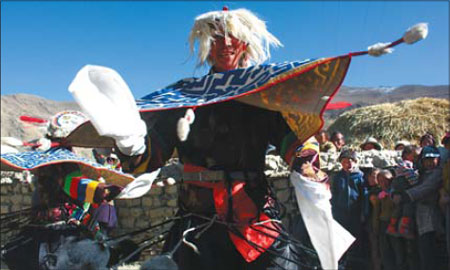Chimed Dondrup, 82, breaks into a toothless grin as the sounds of the drum and bell, and the applause, rise to a crescendo at his home in Bendon village, Chongye County, Lhoka.
|

Traditional white-mask drama performance remains popular in Lhoka.
|
The old man is performing in Baimian Zangxi, or white-mask Tibet drama, that originated in Lhoka more than 700 years ago.
This art form goes back to the 14th century, when a bridge was being built near Bendon and a local leader asked some artists to put together a drama to entertain the people and raise funds. It gets its name from the white masks of wool that the performers wore.
In later centuries, the white-mask drama absorbed many Tibet myths and stories and became a regular feature of traditional Tibetan festivals.
A full-length drama often takes at least one day and the costumes too are expensive.
Chimed used to be one of only two living artists who could understand and play whole chapters of the drama. But now there are seven other practitioners and 22 youngsters are currently being put through the paces.
Since being listed as a national intangible culture heritage in 2006, Baimian Zangxi has come under protection and is backed by financial support from the government. A troupe was established in Bendon village in 2007.
Pema, 41, is one of its leading performers and says, "If we had not got to learn from Chimed and been given the opportunity to travel around Tibet to perform, this art form would have been lost long ago."
(China Daily March 13, 2009)